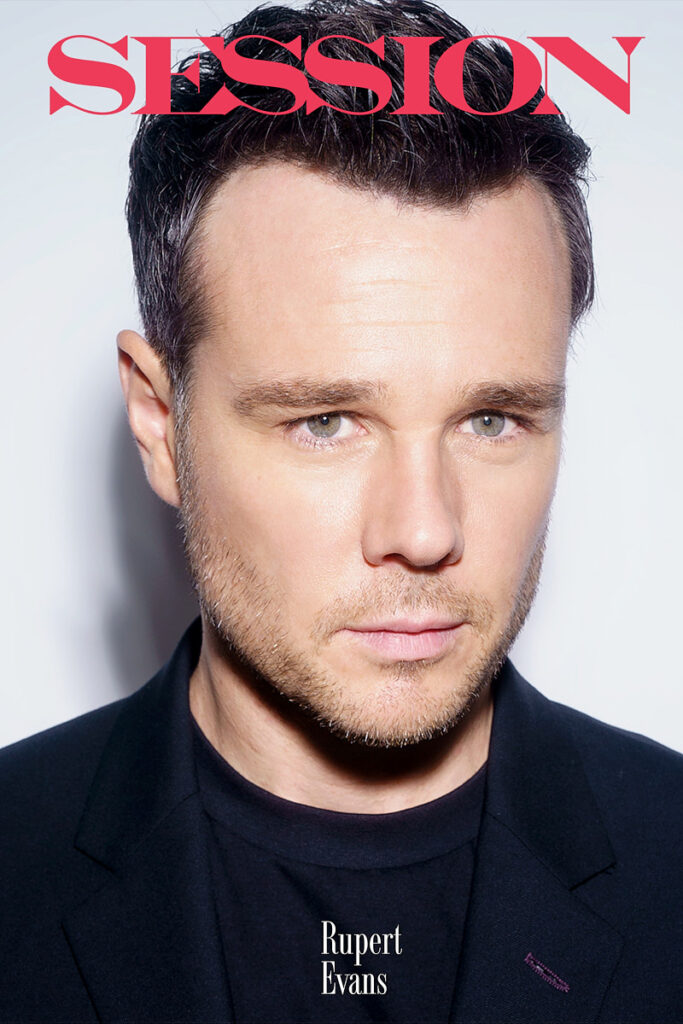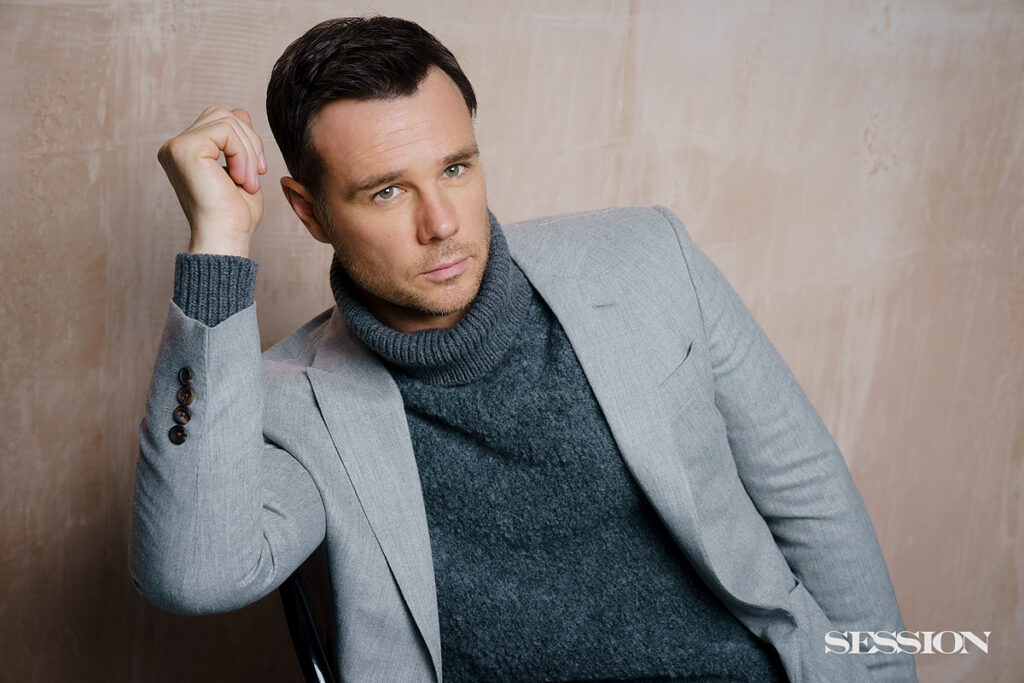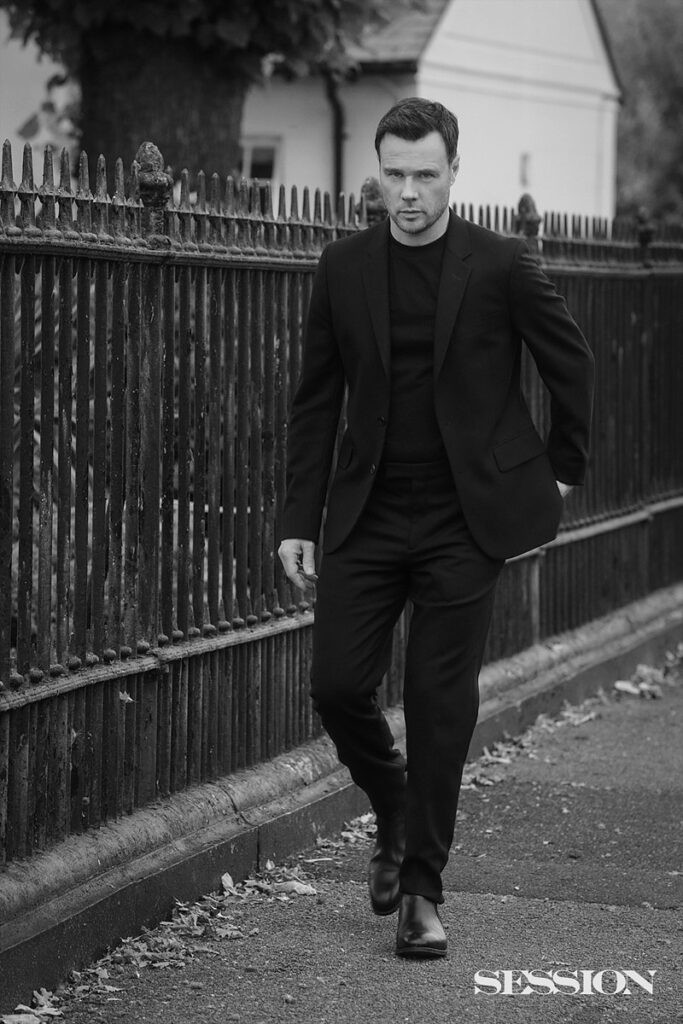Interview by Roman Portnoy
Photography: Ross Ferguson
Styling: Holly Macnaghten
Grooming: Carlos Ferraz

T-shirt – John Smedley
Rupert Evans started his career working mainly in television. In 2006 he starred in his first studio movie, Hellboy, directed by Guillermo Del Toro. Since then he has worked in theatre and independent film and also such notable hits as Bridgerton and Charmed.
When did you start acting and who was your role model growing up?
I started acting at a young age in school about age seven. My debut performance was Dorothy in The Wizard of Oz. And I will never forget that during one performance, I walked on at the beginning of the show wearing the red shoes that were supposed to be put on much later. I was so devastated that I had messed up that I burst into tears.
So from Dorothy, I moved on to Peter Pan, and then from there, I think I jumped into some Shakespeare at a very young age to playing Puck aged about eight or nine. And that’s really where it all started, and where I fell in love with acting. I think I just enjoyed showing off initially.
But as one gets older, I realized there was a little more to it. As for role models, I think my father was always someone who loved musicals, so he really introduced me to musicals. But I suppose acting wise, Paul Schofield is someone who I really admired when I was at drama school and growing up. And I think he really, for me, was the best actor around. I should point out he died in 2008, and I never saw him live. But I listened to a lot of his recordings, particularly his recording of Hamlet, and I became obsessed with it. And so for me, he’s probably my greatest role model.
What was your reaction to landing the role of Edmund Bridgerton in season two of Bridgerton, and do you expect to reprise that role in the next season?
When I got asked play Edmund, I was overjoyed because like most of us on this planet, I had really enjoyed season one. I thought it was such fun and had something very special. I think sometimes shows just capture the moment, and Bridgerton certainly does that. There’s a sort of heightened reality, a heightened joy to it that I love how they shoot it, the color, and I was just very excited to be a part of it. And I think the role of Edmund was talked about a lot in season one, and also it’s sort of very present in season two, so I was very excited.
And as for a reprisal, I am always open for reprisals. Reprisals are an actor’s greatest gift, so I would love to pop in and do a little more, but we will see what happens in the future. The great thing about playing Edmund is he’s dead, so you can always do a flashback. Flashbacks are always helpful, I think, for series shows because then it just explains how the actor is sort of feeling. And I think a much beloved dead father is always a handy flashback tool. So yeah, I would love to do more on Bridgerton.
You’ve been a series regular on Charmed since its debut in 2018. What pushed you to start directing in the latest season?
Well, since starting Charmed, I have always had a secret desire to direct. And I have shadowed a number of directors in the past. And really, Charmed was something that allowed me the opportunity to direct. The creator and executive producers were all incredibly kind. I also think generally there are two types of actors.
There’s the actor that is just very focused on their craft and acting. And then there’s the other type of actor who is always sort of nosy, looking around, asking questions about cameras, lenses, lighting, wondering why this is happening and this is happening.
And I think I am firmly in the second camp of the nosy actor. And I think after a while, the only way to stop me asking questions was just to give me a go at directing. So, I’ve been directing since season two of Charmed and I really love it. And the actors and all the crew have been incredibly supportive. So yeah, I hope to do more. It’s a fantastic gift directing a TV show.

What challenges have you faced going from acting to directing?
There are lots of challenges moving from acting in front of the camera to directing behind the camera, namely time, because as a director you have to spend a lot of time in what they call prep, which is usually a week or so before you start filming. So I’ve had to sort of jump from filming as an actor to preparing the episode that I’m shooting.
And you realize how much is involved and how much work has to be done before you start shooting. Decisions have to be made whether you need a crane or a jib or any kind of camera equipment. And your relationship with your DP (Director of Photography) is really important.
The biggest challenge is when you’re acting and directing at the same time. And that certainly has happened on Charmed. And fortunately, with the advantage of technology, namely a thing called playback, you can do a bit of acting and then run around to video village, shout at some person and say playback. And then they show you that shot and they show you the playback and you watch it instantly. And then you run back again and give people notes and then try it all over again.
And it’s sort of weird because you just have to swap hats. You sort of stop and then you sort of instantly become a director and then you stop becoming a director and then suddenly back becoming an actor. But I think it’s incredibly rewarding, but it is a challenge, there’s no doubt about it. And going from directing to acting and acting to directing so quickly can be time consuming and pretty exhausting.
Has working behind the camera helped you become a better actor? If so, why?
I do think it probably has made me become a slightly better actor. I’ve certainly become more aware technically as an actor. And I think when you do film and television, having a real technical understanding can be a huge advantage. I tell you what it also has done, having now directed a lot, I have become incredibly understanding to other directors. There’s nothing more terrifying. Suddenly you’ve only got 20 minutes to do something and you have an actor in front of you who says, I don’t think I would walk over there and you’re like, you have to walk over there because that’s the story and that’s the shot.
So I’ve become very understanding about how technically scenes work best for the camera and for the story. And now I’m a more tolerant actor with directors and will do exactly what any director tells me because I know how difficult it is being a director. I think now, having been quite sort of difficult in the past, I now really understand how hard it is. I try and be as helpful as possible. But yeah, I think I’ve become, as I said at the beginning of this question, technically a much better actor because I’m really aware of now what the camera can do.
And so I’m very conscious of where the camera is in rehearsals. And I think that helps me certainly do it quicker, which the crew likes. But also I’m able to adapt my performance and really be able to kind of really understand how best to do this, for it to look as good as it can be and tell the story and feel good as an actor as well. So yes, directing has certainly helped me technically, and I’m a much more behaved actor now.
Who are your favorite directors and which one has influenced your work the most?
Well, my favorite directors are varied and wide. I suppose I started with David Lean. I would always start with David Lean. He directed one of my favorites, Lawrence of Arabia and also Doctor Zhivago. For me, he seemed to find ways to transition from the close up to the epic wide shot in ways that had never been done before. And so there are moments in that film that I will always remember and I always go back to in my head.
There were also other directors, younger directors that I will always go and see their work. Francis Lee, for example, British director whose debut film, God’s Own Country made a big splash and I thought was extraordinary, and Chloe Zhao, who won an Oscar recently for No Man’s Land. And then there are other directors that I have followed and love and think and feel that when I watch their movies, I feel something in a way that I don’t with other directors.
There is something nearly tangible about, for example, Terrence Malik’s films. They are extraordinary. Sometimes I don’t like them, but I always feel something. And then other directors like Ken Loach, I suppose Ken Loach, for me, a British director, Kez, was one of the first films that sort of struck me as an extraordinary social piece that I just fell in love with him from then on, really, I will always watch a Ken Loach film. He goes all the way back to the days of what the BBC had called Play for Today, which was a sort of small film that they would show on television of 20 minutes long or something. And they were called The Play for Today. And I suppose his most famous one is a short film called Kathy Come Home. And that also sparked a huge interest in me as a director. So those are just a few.

T-shirt – John Smedley
Jeans – Citizens of Humanity
Boots – Jimmy Choo
What actor would you like to work with and why?
I’ve just been watching Yellowstone and I would love to work with Kevin Costner. He always seems to have so much energy and he puts himself out there in a way. And I always think he’s a consummate professional.
I watched him during the Oscars give a speech and he was so composed. And I think he’s done everything that an actor could wish to do. And he directed Dancing With Wolves which is certainly an epic film. It’s one of my favorite films.
So Kevin Costner for me, I would love to work with him. He seems like an actor’s actor. And the older he gets, I think the better he gets. So there we go, as a surprise to me and you probably, Kevin Costner.
If you could recreate any movie, what would it be and why?
I’m not a huge fan of recreating movies because I think we should move forward and try new stuff. However, there is one movie that has always stuck with me since I was a kid and I would love to. I hesitate to mention this because someone might take this idea, but anyway, it’s a movie called The Water Babies.
It’s a live action animated family film. I think it came out in 1978. And what I remember about the plot, there’s a young boy in the mid-19th century and he’s a chimney sweeper or something and he becomes sort of friends with a girl in a very smart, posh English home and they go on adventures together.
And what’s amazing is that they jump into a deep pool of water in a fast flowing river and suddenly the film switches from having been a normal film to fantasy animation. And as soon as they go into the water, it turns into a cartoon with speaking sea creatures. And I just always loved this idea that outside in the real world there’s a sort of real film. And then under the water is this sort of cartoon world where wonderful things happen. And the juxtaposition between those two worlds, the cartoon, animated world and the real world, always interested me.
What advice would you like to give to aspiring filmmakers?
Well, I make a point of never giving advice to anybody, particularly aspiring filmmakers. But since you’re asking the questions, I’m being put on the spot. I suppose if I was to give any advice, it’s this – just start filming, start filming stuff that you feel connected to, that you understand, that you like and love, whether that’s at home or whether it’s something that you identify with.
I think people get obsessed in the world of film about how do you make a film and generating the money for it? Oh, you should do a genre film. You should do an action film or you should do a horror film. They’re popular. Ultimately, just do a film that you are interested in where you love the story. And if you do that, if you film something that you love and you identify with the story, then I think you can’t go wrong and it will be a brilliant film because it comes from you in a way that no one else can express. So that’s my two cents worth. If I am to give any advice at all, which I don’t.
The last question is if you had to work outside the film industry, what job would you be interested in pursuing?
Well, there’s two things. I grew up on a farm and I love farming still. And I sometimes go back to my dad’s farm and there’s still a part of me that would just love to be driving around on a tractor and sort of being a farmer.
And if not a farmer, then I suppose I would love to have been a gardener. I did think about it for a while. I love being outside and I think I love gardens and I love how I feel in a garden. And when I get some time off, I hope to actually spend more time in my garden. Being in touch with nature, I suppose that’s what it comes down to.
I think that’s just me having been working and living in a sound studio and stage for a long time now. I always crave peace and quiet. And the garden is that to me. So I will perhaps get some gloves, get some green fingers on and start planting, start growing vegetables. That’s what we all need to do, don’t we? That’s what I’ll be doing if I get a moment’s peace.
This interview has been edited for length and clarity.

